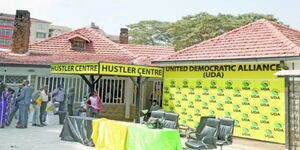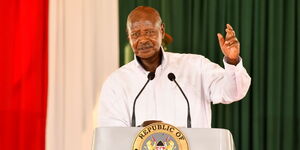Businesses and homes could be forced to find alternative internet in Nairobi as the county begins a crackdown on illegal fibre optic cables.
Nairobi County on Tuesday, February 25, started the process of dismantling fibre optic cables mounted on power poles along key highways.
According to the county, the dismantling of the cables comes as Governor Johnson Sakaja pushes the county to create more own-source revenue amid an escalating fight with the country’s power distributor, Kenya Power.
“Some of these fibre lines are illegal. We have given the affected service providers ample time to pay for hosting them on these poles, but they have refused. They have neither paid for wayleaves nor sought county approval,” Nairobi County Revenue Chief Officer Tiras Njoroge said during the launch of the crackdown.
According to the revenue officer, internet service providers should ensure that all fibre optic installations on county road reserves have the necessary approvals and that wayleave fees are fully paid.
This crackdown is likely to affect businesses and homes within the capital in a world where most, if not all services are dependent on the internet.
The Nairobi City County Finance Act, 2023, provides that the installation of power lines and fibre optic cables on road reserves be subject to wayleave charges. These charges apply to entities such as utility companies and internet service providers that utilise public land for their infrastructure.
For instance, when applying for a wayleave over short distances, the application fee is set at Ksh5,200 for stretches ranging from 1 to 2 kilometers. If the distance extends slightly further, from 2 to 5 kilometers, the application fee increases to Ksh 6,500.
For cases involving distances beyond 5 kilometers, the fee remains at Ksh6,500 for every additional kilometer.
In addition to the application fees, there are also annual charges associated with the use of different types of land features such as carriageways, footpaths, and verges.
The annual charge for maintaining a carriageway is Ksh200 per meter, while footpaths incur a fee of Ksh150 per meter annually.
Furthermore, verges are categorised based on their proximity to the plot boundary, with a charge of Ksh60 per meter for those within 1.5 meters and Ksh150 per meter for verges that lie beyond that distance.
This is not the first time a government agency is seeking hold of the internet cables.
In October 2019, Kenya Power issued a 14-day ultimatum to unlicensed telecommunication operators to remove illegally mounted fibre optic cables from its distribution poles, citing safety hazards and legal breaches.












